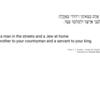4: Excerpt from poem, Y. L. Gordon's "Awake, My People!" in Hebrew, 1866, and in English translation, 1988.
These two lines from the poem are widely cited and might be considered the crux of the poem's argument.
Suggested Activities: Focus in on these two lines of the poem, asking students some of these questions:
- How do you understand these lines?
- What do you think Gordon means by be a “man” versus be a “Jew”?
- Gordon uses the word “אָדָם” rather than “ אִישׁ” to mean “person” or “man.” “אָדָם” (Adam) evokes the Garden of Eden and the Judeo-Christian origin story, while “ אִישׁ,” when it appears in Pirkei Avot 2:5, is understood to refer to a person of moral courage. Does that difference matter?
- “אָהֳלֶךָ” is translated as “at home” but literally it means “in your tents.” How does this translation choice change our reading of the poem?
- The second line refers to being a brother and a servant. Can you find an allegory from Biblical texts where being a brother and a servant were in conflict? How was that conflict resolved? Is Y. L. Gordon hoping for a similar resolution?
Sources: Michael Stanislawski, For Whom Do I Toil?: Judah Leib Gordon and the Crisis of Russian Jewry (Oxford: Oxford University Press, 1988).
R4_Be_a_Man_in_the_Street.jpg
 Download image (103.86 KB)
Download image (103.86 KB)

